Best Browser for Trading Stocks and Crypto - 7 Fast Options
8 min. read
Published on
Read our disclosure page to find out how can you help MSPoweruser sustain the editorial team Read more
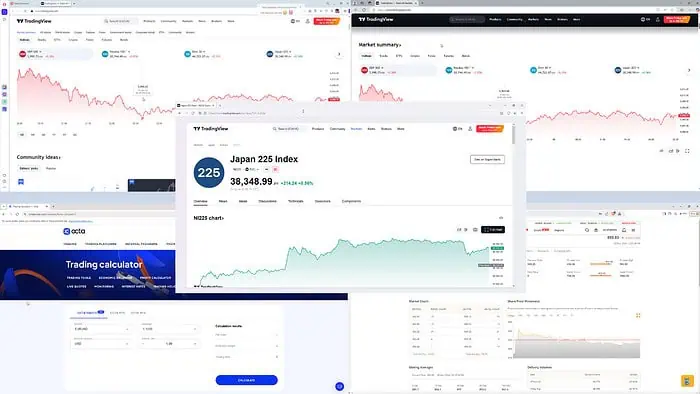
Looking for the best browser for trading to gain an edge over your competitors?
Most high-frequency, commercial, and individual trading apps ensure less than 100 ms round-trip latency for critical transactions during trading sessions. Your choice of browser is responsible for the fast response time, not to mention there are security and privacy considerations.
I’ve tested more than 20 apps for three days. I’ve run trading web apps on these browsers to evaluate their features, response times, resource utilization, speed, and reliability.
Let’s have a look!
Best Browser for Trading
Let me introduce you to the best web browsers you can use in mission-critical stock and crypto trading scenarios.
Comparison Table
Find below a quick comparison of all the best services for trading online in stocks, commodities, futures, bonds, and cryptocurrencies.
| Features | Opera | Brave | Firefox | AVG | Chrome | Tor | Edge |
| Speed | High | High | High | Standard | Standard | Medium | Standard |
| Resource usage | Optimal | Optimal | Optimal | Moderate | High | Optimal | High |
| Extensions and plugins | Limited | Limited | Moderate | Limited | High | Limited | Moderate |
| Security features | High | High | High | Extensive | High | High | Extensive |
| Tab management | Efficient | Efficient | Efficient | Efficient | Poor | Efficient | Poor |
Now, let’s look at the detailed reviews:
1. Opera Web Browser
If you’re into stock or crypto trading, Opera might just be the perfect browser for you. It’s lightweight, meaning it doesn’t hog your RAM or CPU, so everything runs smoothly. Also, you’ll love the extra workspace, thanks to its intuitive tab navigation and handy sidebar.
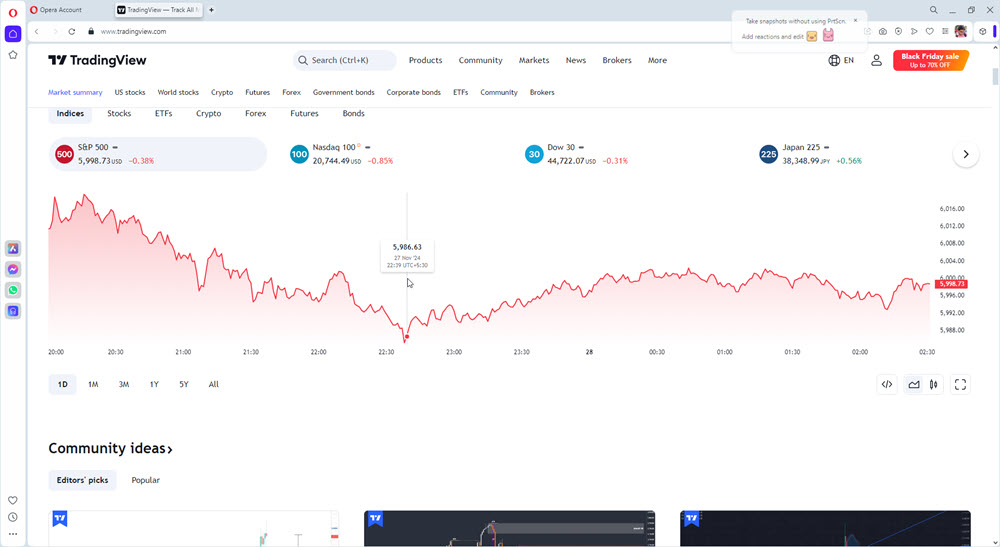
Need some tunes while you trade? The built-in music player has you covered. Plus, Opera supports a bunch of plugins, making it super customizable.
Furthermore, with its integrated crypto wallet and VPN, your trades stay secure and efficient. Add in its user-friendly design and powerful features, and it’s easy to see why so many traders swear by it. Moreover, it’s the officially supported browser of TradingView.
| Pros | Cons |
| Built-in AI, like ChatGPT, ChatSonic, and Aria. | The Speed Dial menu is cluttered with promoted website links. |
| Super lightweight browser for Windows devices. | Not an open-source web browser as you might require one for customization purposes. |
| Available on Windows, macOS, and Linux. | Its native extension library is limited. You’ll often need to rely on the Chrome Web Store. |
| Loads pages faster than Chrome and Edge. | |
| Manages system resources efficiently. | |
| Built-in screenshot tool for quick snapshots of trading, charts, prices, etc. |
2. Brave Browser
Brave is another great pick for stock and crypto trading worldwide. It’s lightweight, so it won’t slow your computer down or drain your resources. Everything just works smoothly, which is a relief when you’ve got charts and trades open.
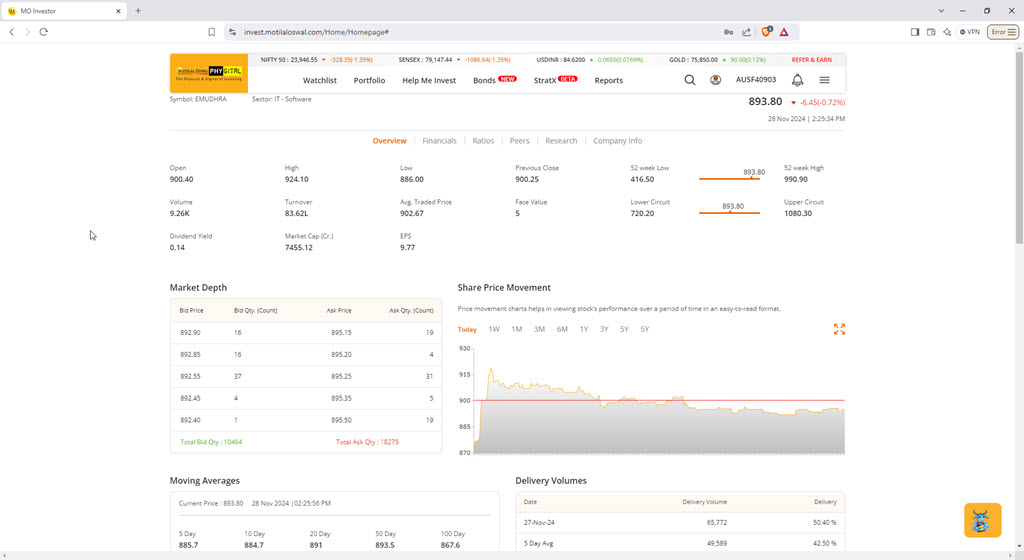
What I love most is how it keeps things private. Brave blocks ads and trackers, so you’re not bombarded with distractions while you’re trying to focus. On top of that, it’s packed with useful features, like a built-in VPN for extra security and AI tools that actually help with smart insights. And the crypto wallet? It’s built right in, making it super easy to handle transactions and store your coins securely.
| Pros | Cons |
| It offers the best browsing privacy. | Limited options for browser add-ons. |
| You can use the built-in VPN for free. | It comes with an intermediate-level learning curve. |
| You can earn free crypto tokens for ads. | Since the built-in VPN is free, its reliability and browsing speed can be limited compared to premium services. |
| Shows updates about popular crypto drops and events automatically according to your browsing habits. |
Get Brave Browser
3. Mozilla Firefox
If you’ve been using Google Chrome so far but find it resource-heavy, you can go for Mozilla Firefox instead. It comes with a similar user interface as you’re used to. However, it consumes much less memory and CPU bandwidth when you open the same type and number of websites.
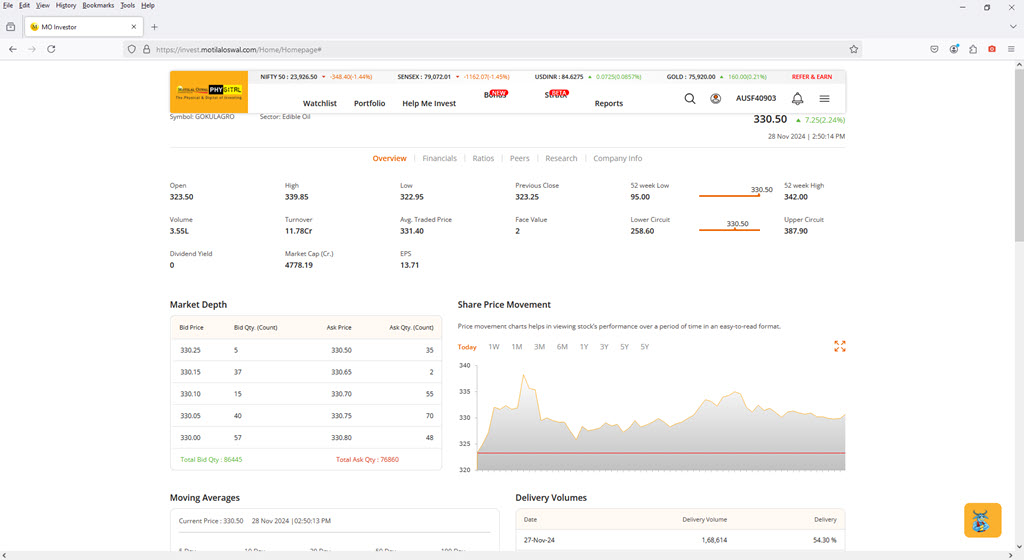
I’ve noticed it loads trading apps, charts, and crypto exchanges much faster than Chrome. Furthermore, it comes with a built-in privacy tracker that doesn’t allow pesky online trackers to monitor your activities.
| Pros | Cons |
| Faster than Google Chrome. | Doesn’t offer built-in crypto or digital wallets. |
| Comes with a familiar user interface. | There’s no native VPN tool for basic usage. |
| Supports add-ons that are available in the Chrome Web Store. | The actual browsing space might feel a bit cluttered. |
| It’s compatible with the same Chrome keyboard shortcuts. | |
| Updated frequently to fix security and program issues. |
Get Mozilla Firefox
4. AVG Secure Browser
If you’re highly cautious about privacy when trading online, interpreting charts, and submitting high-stakes trading orders, try AVG Secure Browser.
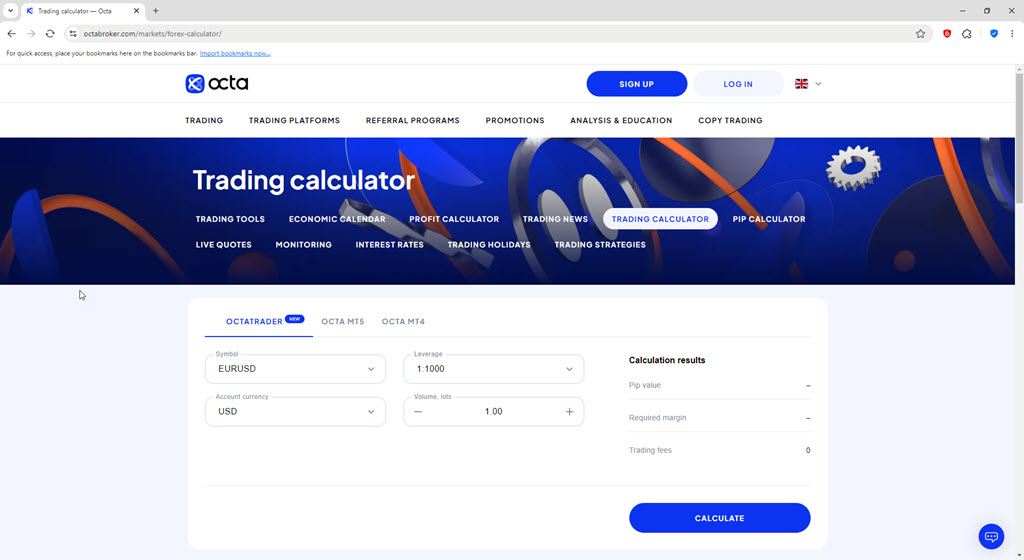
It’s designed to keep you safe with a built-in VPN that encrypts your connection, ensuring your data stays private. You won’t have to deal with ads or trackers, creating a clean, distraction-free online environment for your trades. Plus, it offers solid protection against phishing and malware, so you can trade with peace of mind.
| Pros | Cons |
| It’s from the trusted antivirus developer AVG, Gen Digital Inc. | Takes a while to install compared to most popular web browsers. |
| It comes for free. No need to own any AVG Antivirus license. | Limited customization options. |
| Native and free VPN. | It’s not an open-source browser. |
| Phishing protection. | |
| Compatible with Chrome extensions. |
5. Google Chrome
Google Chrome is one of the best trading browsers to have on your side. It’s widely used for a reason—it’s fast, reliable, and packed with features that traders appreciate. There’s a huge collection of extensions and tools in the Chrome Web Store designed specifically for it.

Need quick market info? The built-in Google Search has you covered. Since it’s a Google product, Chrome gets regular updates to keep things running smoothly. Plus, its strong focus on security, like blocking phishing scams and malware, helps you trade with peace of mind.
| Pros | Cons |
| Built-in Google Search. | High memory usage. |
| The leading web browser. | Frequent updates can disrupt work. |
| Developed, maintained, and updated by Google. | Google is intentionally disabling many ad-blockers. |
| Developer tools for debugging. | High CPU usage. |
| Efficient JavaScript engine (V8). | Can slow down with too many open tabs. |
Get Google Chrome
6. Tor Browser
Tor Browser is a secure option to access online trading apps and exchanges. You should use it specifically for its focus on anonymity, data privacy, and the ability to unblock geo-restricted sites and content. It routes your internet data through multiple servers around the world.
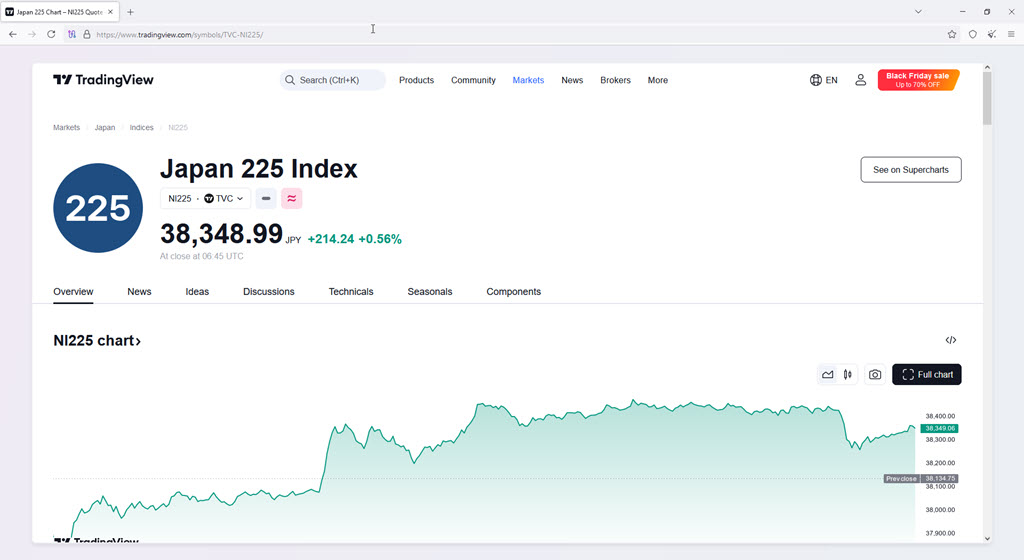
This way it masks your IP address and ensures your activities remain private. The same protocol also makes it difficult for anyone to track your online behavior. Additionally, it comes with built-in features like HTTPS Everywhere and NoScript for secure trading transactions.
| Pros | Cons |
| High level of anonymity. | Slower browsing speed due to multiple relays. |
| Access to geo-restricted content. | Some services block Tor traffic. |
| Enhanced privacy with multi-layer encryption. | Might not be suitable for all trading apps and brokers. |
| Built-in security features (HTTPS Everywhere, NoScript). | |
| Open source code. |
Get Tor Browser
7. Microsoft Edge
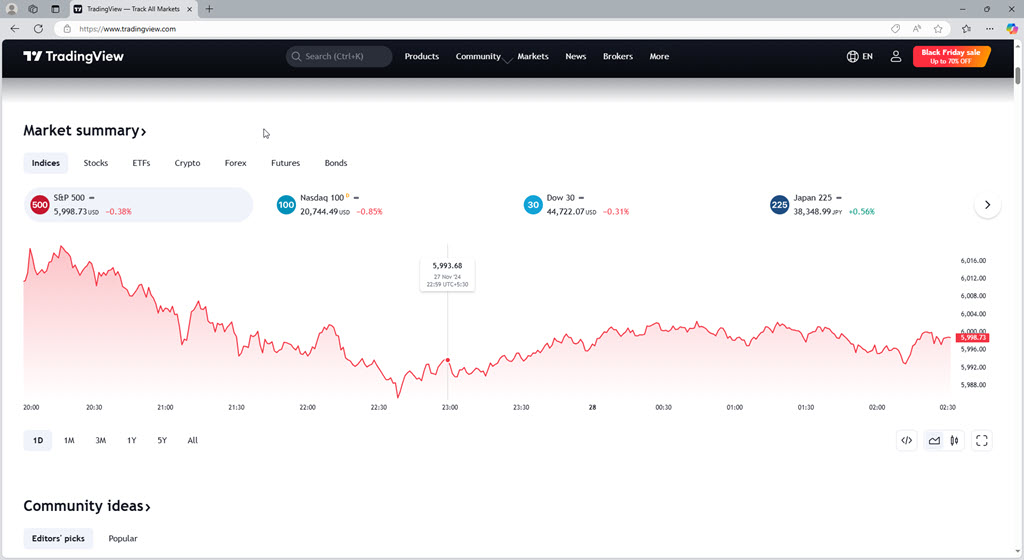
Microsoft Edge is yet another secure and fast browser for stock or crypto trading. It’s built on the Chromium engine, so pages load quickly. You can also easily use Chrome extensions for trading tools or market widgets. Plus, with Microsoft Defender SmartScreen built-in, you get strong protection against phishing and malware, keeping your transactions safe.
| Pros | Cons |
| Built on the Chromium engine, so it offers a similar user interface as Chrome. | Less private than some browsers. |
| Compatible with Chrome extensions. | Doesn’t have built-in VPN or digital wallet apps. |
| Vertical tabs for better organization. | Not useful for non-Windows computers. |
| Efficient tab management features. | Multiple toolbars can clutter the user interface. |
Get Microsoft Edge
How I Chose the Best Browser for Trading
I focused on the following factors during my research:
- High-frequency and commercial trading is all about placing an order at the right time. So, I picked only those apps popular for speedy DNS resolving and page loading.
- Stability and reliability are next to none for trading browsers. So, I’ve only chosen services that don’t have a reputation for crashing during intense trading sessions.
- Add-ons and plug-in support are essential when you’re using browser-based trading apps.
- The browser should support the trading broker you’re subscribed to, their databases, servers, and especially the trading app.
- It should consume CPU and RAM efficiently so other trading apps can run simultaneously on the same PC.
- The best trading web browser should support add-ons for blocking ads and pop-ups so you can focus.
- It should have JavaScript and WebSocket support for real-time data.
How To Use Opera for Trading
Here’s a quick demonstration:
- Download and install Opera.
- Visit the website of the trading app or broker.
- Log in using your trading account.
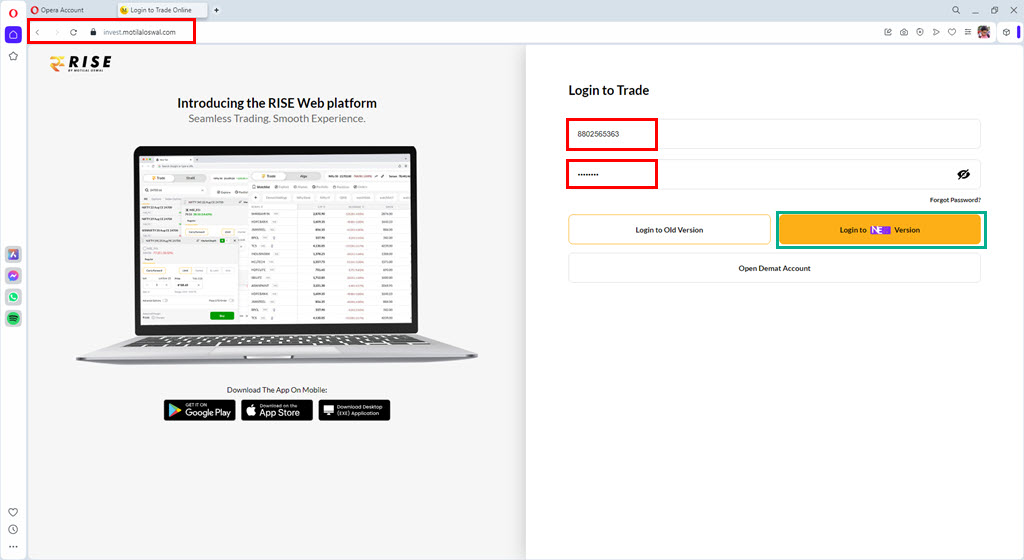
- Authenticate with two-factor systems like mobile phone OTP or email OTP.
- Navigate to your portfolio.
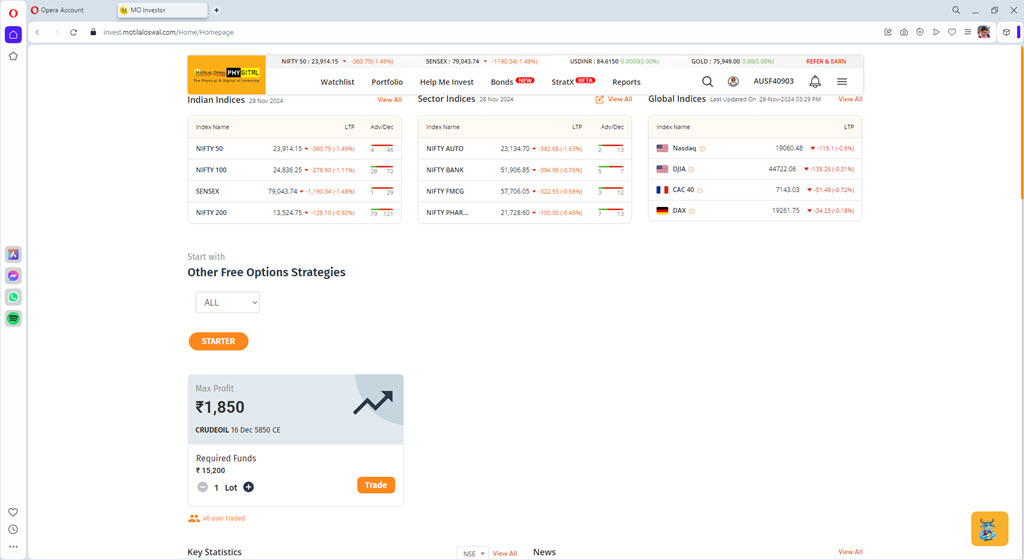
- Choose a stock to trade.
- Place a buy or sell order.
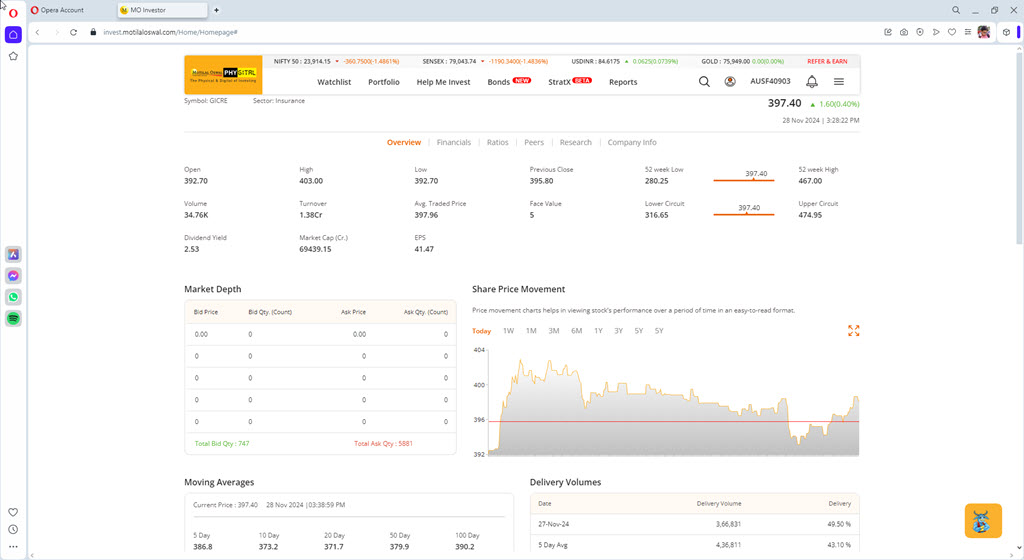
Conclusion
So, now you know which is the best browser for trading in the stock and crypto exchanges.
Try them out and choose the one that meets your requirements and trading habits.
Don’t forget to share your pick in the comment box!








User forum
0 messages